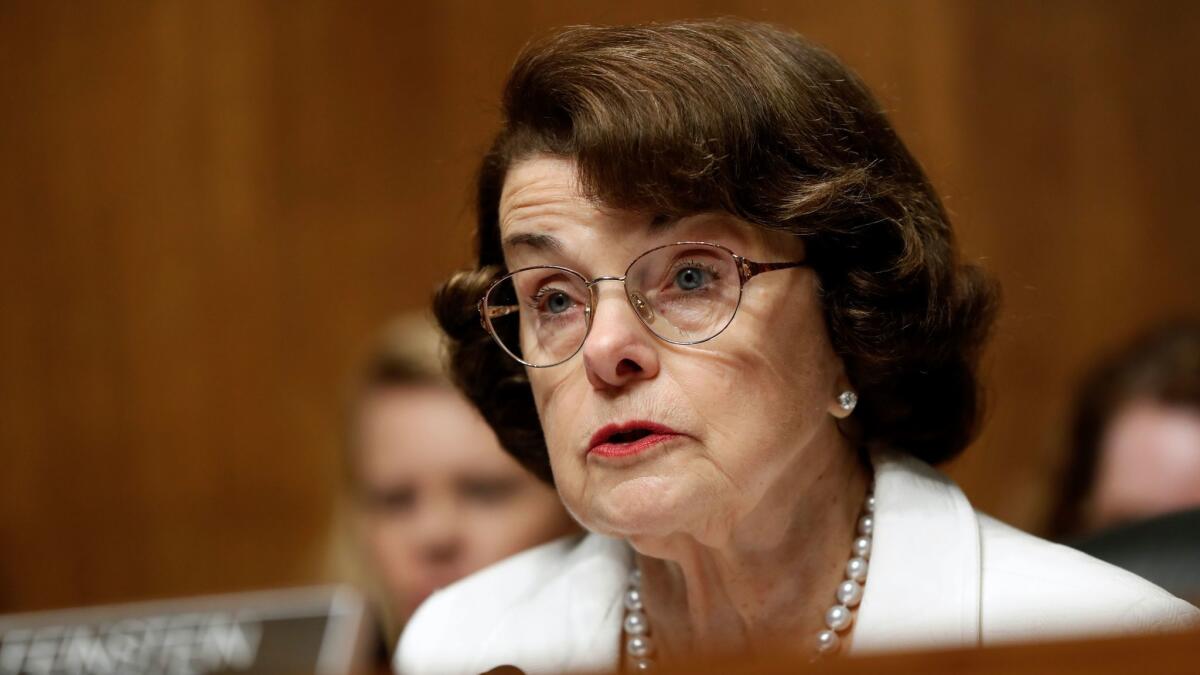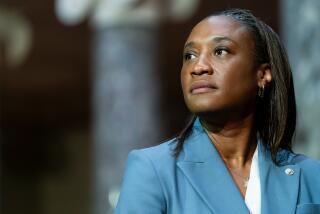Op-Ed: Why Dianne Feinstein shouldn’t run again

- Share via
At age 84, Dianne Feinstein is the oldest of the 100 United States senators. And the word, both in Washington and around California, is that she plans to run for reelection next year to a six-year term that will end when she’s 91.
That would squeak her in under the actuarial wire. By the calculations of the Social Security Administration, the life expectancy of an 84-year-old American woman is 7.7 years. If Feinstein hews to the actuarial norm, she’ll live to 92.
She could well hew to more than the norm, of course. Feinstein, by all appearances, is no less alert and active today than she’s been in recent years. On the other hand, that’s no guarantee that she’d be that way as a nonagenarian in 2024.
The problem with yet another Feinstein candidacy is partly a matter of image. Ever since the tea party landslide of 2010 wiped out a generation of Democratic up-and-comers, many of the party’s central figures — Barack Obama decisively excepted — have been disproportionately older. Some of those Democrats have flourished with age: Sen. Bernie Sanders, technically an Independent, has led a rebirth of the American left; Rep. Nancy Pelosi remains the most accomplished legislative leader Congress has seen in many decades; Rep. Maxine Waters has become the bubbe of the anti-Trump activists; and Jerry Brown, in his second go-round as California governor, has become the nation’s commander-in-chief in the fight against climate change.
Both California and the Democratic Party have all but reinvented themselves politically since Feinstein was first sworn in as senator; she has not.
Feinstein can claim no such distinction: She’s been a reliable Democratic vote, which is no small thing in an age when the distance between the two parties can be measured in light-years. Given the politics of Californians, however, it’s inconceivable that her successor, should she choose to stand down, would not be a Democrat, too.
The centrism that bolstered Feinstein’s electoral prospects when she was on the ballot in the 1990s is no longer the sine qua non for victory in California, if it ever was. The state has clearly moved to the left in the ensuing decades. And while on some issues, Feinstein has embraced the new progressivism, she can’t be said to have led the way on such signature liberal causes as universal healthcare, the $15 minimum wage, campaign finance reform, tuition-free higher education, battling climate change or reining in Wall Street.
That doesn’t mean she’s likely to get a Democratic challenger should she run: The list of contests Democrats believe they must win in 2018 is already plenty long, which makes it very unlikely that a Feinstein opponent could raise sufficient resources to wage a credible campaign. If Feinstein runs, Feinstein wins.
Yet that’s precisely why she shouldn’t run. Both California and the Democratic Party have all but reinvented themselves politically since Feinstein was first sworn in as senator; she has not. There are a host of younger Democrats more attuned than she to their party’s new progressivism: Ro Khanna and Linda Sanchez in the U.S. House; Kevin De León in the state Senate; Controller Betty Yee in Sacramento; Eric Garcetti in City Hall; Tom Steyer on the Bay Area Billionaires’ Row. Rep. Adam Schiff is more a moderate in the Feinstein mold, but, as his work investigating the Trump-Russia connections makes clear, he displays an intensity of engagement that eludes Feinstein.
With California Republicans increasingly unable to win statewide office or hold on to congressional and legislative districts undergoing demographic change, the Democratic bench in California grows steadily more populous. These Democrats deserve a greater presence in D.C.
In itself, of course, generational change offers no guarantee of improvement. No member of the state’s — or the nation’s — current congressional delegation can match the legislative genius of Henry Waxman, the West Los Angeles congressman who managed to expand Medicaid even during Ronald Reagan’s presidency and stepped down in 2014 after 40 years in the House.
But precisely because Waxmans are exceptions to the rule, generational renewal is one of the metrics by which we can measure the strength and potential of a political party. Elected officials are not indispensable; even the great ones are mortal.
Dianne Feinstein does herself — and her state, and her party — no favors by running for office one more time. Best to call it a day.
Harold Meyerson is executive editor of the American Prospect. He is a contributing writer to Opinion.
Follow the Opinion section on Twitter @latimesopinion or Facebook
More to Read
A cure for the common opinion
Get thought-provoking perspectives with our weekly newsletter.
You may occasionally receive promotional content from the Los Angeles Times.






